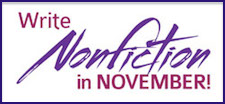 In today’s amazing online world, one tool stands out for nonfiction writers above all the others. Bigger than video, better than podcasting, more powerful than teleseminars, and more robust than webinars.
In today’s amazing online world, one tool stands out for nonfiction writers above all the others. Bigger than video, better than podcasting, more powerful than teleseminars, and more robust than webinars.
Yes, it’s blogging.
Let me explain why.
Bookselling From the Inside Out
The natural relationship between a nonfiction book and a blog on the same subject is both powerful and full of potential.
I would go so far as to say that any nonfiction author who does not maintain a blog on their subject matter is missing out on what may be the best marketing available to them. And that’s a shame.
The synergy between your book and your blog can be incredibly productive in many ways that will allow you to build a business—and a career—around your book.
A blog will:
- Naturally build a community of people interested in your subject
- Allow you to build both a mailing list and an email list, the heart of your future promotion efforts
- Give you a media platform to promote and publicize your book and other products and services
- Create great networking opportunities with other thought leaders in your field
- Bring you and your work to the attention of media, people who book speakers for events, and other people you want to know
- Establish an online “hub” or base of operations for your social media and book-related marketing
- Provide many opportunities to communicate directly with your target audience.
Okay, so there are abundant reasons to blog about your nonfiction subject matter, whatever it may be. But that leads to the next question:
How do you turn that into a real, live business?
There are millions of bloggers, but only a handful have successfully made this transition. Each followed their own path.
I’ve built two successful businesses from one blog, so that’s the path I know. Thinking back over the past five years, the lessons learned, what worked and what didn’t, I can pass along the following tips for other authors who want to do the same.
Turning Your Blog Into a Business
Here are the tools I’ve used, and continue to use, to create two six-figure businesses from a niche subject matter blog. Starting with the simplest and moving to more challenging efforts, these are things that you can do, too.
- PDF Ebooks—Believe it or not, the foundation of your blog-to-business plan can be as simple as a free PDF ebook. If it’s targeted specifically at newcomers to your field and offered in exchange for permission to send emails about your subject, you will rapidly start to acquire a list of people who self-select themselves. In other words, anyone taking the time to download your ebook is likely to be a good prospect for whatever else you’ll be offering in the future, even if you don’t know what that will be.
- Affiliate promotions—Even with a small email list, you can start to earn income from your blogging without even producing a book or any other product. When you see others offering products or services that fit your niche and would appeal to your readers, find out if you can become an affiliate. All you have to do then is tell the people on your list about the great resource you’ve found for them, and you will make money with each sale. For many bloggers, this is the best way to get started because virtually all the work is done by someone else.
- Webinars—These live events have become incredibly popular in recent years, and you can use them in a multitude of ways to promote your own book, an affiliate, or as the ideal lead-in to a special offer of almost any kind. They take a little work to set up, so you might want to partner with someone else the first time you run one. I know one author who ran a paid webinar on a hot new subject in his field, put 1,000 people into the event and charged $47 for an information-packed, incredibly useful 90-minute event. Everyone walked away happy, and I’m sure you can do the math.
- More books—Early on I realized one of the best things I had to offer newcomers was information on basic areas that often confused them. I wrote lots of blog posts about basics, then collected the blog posts into simple PDFs and started selling them on my site for $7 – $12. This doesn’t sound like a lot of money, but they sell every single day, constantly dripping dollars into my PayPal account. Not only that, but because they address the very things that most people are wondering about, they help to reinforce my authority in my field. And for people who don’t have a lot of money to spend, it’s great to have these low-priced items available.
- Workshops—Although most of the workshops I’ve run are free, as part of an industry conference, I’ve also dabbled in paid workshops. You can charge between $100 and $500 for a full day workshop, and the contact you have with attendees is priceless. These are intensive learning environments, and work best when there’s a strong element of participation. And because it’s a live event and people get sustained contact with you, you’ll find them to be popular if you live in an area with enough people interested in your topic.
- Membership groups—Membership in a group that provides a place for people to meet and interact, receive unique content not available anywhere else, and get answers to questions from experts in the field is another popular strategy for regular income. It can be a challenge to keep a membership group running well, and there’s some technology you may need help with, but the rewards can be outstanding. One niche marketer I know started a small group to provide these benefits to his members, and he now has thousands of people paying a very reasonable $20 per month to belong.
- Training courses—Perhaps the best monetization strategy of all is developing and delivering online training courses. Although quite a bit more work is involved in figuring out how to produce and deliver training, it can be very profitable. And if you’ve followed any of the other suggestions here, you may now have an audience hungry for more in-depth teaching. Training courses, especially in niche subjects, can often cost hundreds or thousands of dollars. It’s up to you to establish the value of this training. Then you’ll see some spectacular results.
I haven’t tried in this article to exhaust all the possibilities for building a business from a nonfiction book and a blog. What I have tried to show you is one path to profitability, and the kinds of experiences I’ve had confronting this same challenge.
The hardest part is starting, so begin with something simple. You’ll soon be on your way to actualizing your own dream of independence.
About the Author
 Joel Friedlander is an award-winning book designer and blogger. Joel writes TheBookDesigner.com, a popular blog on indie publishing, and he is the founder of The Self-Publishing Roadmap, a training course for authors, and BookDesignTemplates.com, where he provides tools and services for authors who publish their own books. Joel is also a past president of the Bay Area Independent Publishers Association.
Joel Friedlander is an award-winning book designer and blogger. Joel writes TheBookDesigner.com, a popular blog on indie publishing, and he is the founder of The Self-Publishing Roadmap, a training course for authors, and BookDesignTemplates.com, where he provides tools and services for authors who publish their own books. Joel is also a past president of the Bay Area Independent Publishers Association.
Copyright: ivelinradkov / 123RF Stock Photo.

